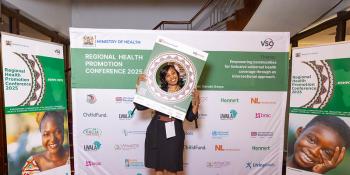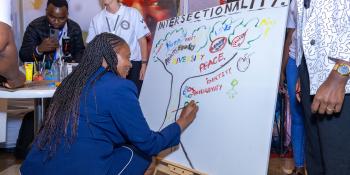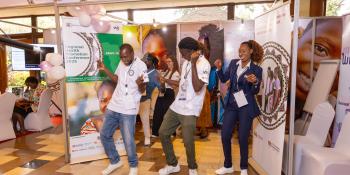Volunteer Elisabeth Kisakye, her husband and baby daughter endured a terrifying experience when they were battered by Cyclone Idai in Mozabique's Manica Province. But, as she explains in her report from the field, millions of others are now enduring far worse horrors.
In the last year there's been a lot of work done by VSO preparing volunteers in Mozambique for such disasters, to respond, do risk assessments and so on. But I could never have imagined the scale of the devastation that has been caused by Cyclone Idai, which hit us a few days ago.
I'm a communications & advocacy volunteer based in Chimoio town, in Mozambique's Manica Province. Last week, my placement was progressing normally. I was training community volunteers in youth engagement techniques, when we heard the news that Cyclone Idai was coming.
Red alert

Suddenly, it was all over the news. We were getting email alerts from our country director. The international community had placed Mozambique on red alert: a huge cyclone was on its way and it could be dangerous.
I was frightened. My husband and I are from Uganda, which is a landlocked country, so we've never experienced this before.
There were no flights from where we were to or from Maputo. The roads were at risk of flooding, because the rivers were already very high. So we decided it was safest to stay.
Trapped inside
On Friday last week, the winds became very strong. We were advised to stock up on food and water in case we couldn't leave home for a while, and keep an emergency bag on hand. It turned out to be good advice.
We were trapped indoors for three days, without electricity, running water or signal.
On the second day, Saturday, the wind became very loud. Objects were flying about, here and there. We could hear banging, but we couldn't tell what was happening: was that someone's roof opening to the elements, someone's door flying off its hinges?
We'd been warned to stay away from the windows, because a flying object could hit and kill you at any time. For days we were filled with uncertainty.
The aftermath
When we first went out, we saw lots of damage. There were branches everywhere. Cables and lights had come down and we were afraid of the risk of electrocution.
But it wasn't until we met a neighbour that we realised how blessed we had been, how fortunate to have a well constructed house. His home had completely been destroyed.
As the signal returned, alongside increasingly worried messages from friends and family, we read news and began to learn of the full extent of the disaster.
Carnage and heartbreak
It's hard to keep up with the statistics, because every day more people are dying from infections and the like, or missing people discovered dead. In our village, we have counted around 30 people who have lost their lives, but other places were far worse affected.
The coastal city of Beira has been almost completely destroyed and lies underwater. The people in Beira, the people in Manica, they're in a very desperate state. We're talking about children who are left homeless right now, who have lost their parents. People who have lost their homes and are fearing the future.
Governments now estimate that 2.6 million people have been affected by the floods. But because it is so hard to reach people affected, we don’t yet know how many people have been killed or are homeless and the figures are set to go up in the coming days.
An appeal for help
VSO staff and volunteers are involved in the immediate relief effort, helping load and distribute emergency supplies headed to the worst affected districts over the coming days.
Even after the immediate rescue and relief operation, Mozambicans will need support. Over 6,000 houses and 18 hospitals have been destroyed in Mozambique alone, along with many schools.
VSO has a great group of community volunteers right across the country, ready to help respond in a meaningful way. Alongside distributing food and bedding, I also believe they can help by providing psychosocial support to heal the emotional wounds that come with the panic, and fear of the unknown, uncertain future people now are facing.
It's important that we respond and see how we can help these people, who are already drowning, to rise above this issue.
That's why VSO is today launching an emergency fundraising appeal for people affected by Cyclone Idai, so that we can pull together and do something to help.
Read more

In photos: Our Regional Health Promotion Conference 2025
Check out some of our favourite photos from Regional Health Promotion Conference (RHPC25). This event sought to reimagine Universal Health Coverage through the lens of intersectionality.

Using intersectionality to create healthy beginnings and hopeful futures
World Health Day brings global attention to the urgent need to end preventable maternal and newborn deaths. Learn more about how our Regional Health Promotion Conference is tackling these issues head on.

Highlights from the Regional Health Promotion Conference 2025
The Regional Health Promotion Conference 2025 reimagined Universal Health Coverage (UHC) through the lens of intersectionality, by bringing together experts from across East Africa and beyond.
